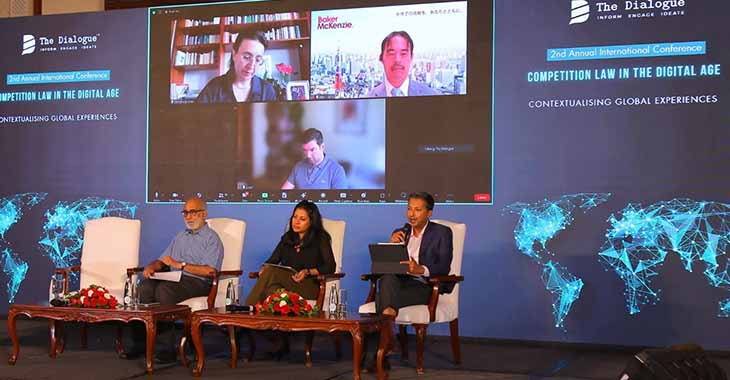Competition Frameworks Should Prioritise Domestic Realities to Enhance India’s Economic Growth

The Dialogue hosted its 2nd Annual International Conference on ‘Competition Law in the Digital Age: Contextualising Global Experiences’, to discuss the role of technology markets in national and global economies and the approach of competition law and policy towards them. The event was attended by eminent personalities from inter-governmental organisations, international scholars and domain experts.
The experts emphasised the need to test frameworks that prioritise domestic realities and are customised to India’s needs. Most highlighted the necessity of tailoring competition laws to reflect the unique economic, social, and technological contexts of individual countries.
Lazar Radic, Senior Scholar for Competition Policy at ICLE and Adjunct Professor of Law at IE Law School, said, “The Digital Markets Act (DMA) primarily focuses on business users and platforms, emphasising ‘fairness’. However, consumers and efficiencies are not part of the equation. While some may believe Europe’s approach will inevitably influence global standards, this isn’t always the case. Europe’s strategy, including its push for digital sovereignty, reflects a form of protectionism that diverges from traditional free market principles. Therefore, other countries with different priorities or free market inclinations need not adopt similar rules. Unlike broad competition laws, the DMA resembles industrial policy, allowing countries to either opt-out or develop alternative frameworks.”
Stakeholders in the Global South called for a more localised approach to developing competition policies rather than disproportionately relying on frameworks of the developed world, adding that while insights from these regions can be valuable, reliance on them should be minimal.
Dr. Amar Patnaik, Former Member of Parliament (Rajya Sabha), said, “In the past two years, a lot has happened. For instance, the Competition Amendment Act 2023 has been enacted. At times, stakeholders have mentioned that the Competition Amendment Act is well-equipped to regulate digital market concerns. On the other hand, it has also been said that the amendments may not be sufficient, and a new law is necessary. While we explore new laws for tech markets, it is worth examining whether the Competition Amendment Act can effectively address these issues of the digital markets. The Parliamentary Standing Committee (PSC), in which I was a member, advocated for ex-ante legislation for combating anti-trust issues in the digital space, particularly the Big Tech. This interplay between the amendments and the Digital Competition Bill (DCB) should be looked into. Such interplay exists between the Competition Law and the Consumer Protection Act and the now enacted, Digital Data Protection Act. Time is ripe for principle-based legislations to build trust and the rules can evolve over a period of time as technology evolves.”
Rahul Rai, Partner, Axiom5, added, “India has a thriving startup ecosystem that drives our focus on promoting and protecting these businesses. In contrast, Europe lacks such an ecosystem and is focused on creating one, while America, having a robust startup environment, aims to address issues within its own market before expanding its approach. We need to consider similarly, how the priorities and experiences of the Global South countries can also be conceptualised in a similar manner.”
Panelists also discussed the necessity of considering how competition regulations in digital markets can impact consumer welfare and the growth prospects of nascent businesses. Notably, The Dialogue announced a survey-based paper examining the potential implications of India’s proposed Digital Competition Bill for business users in the country. Preliminary observations from the study note that 88.8% of business users believe that the digital services they use are important for the success of their business. Therefore, any law regulating digital services should be mindful of their significance to business users, including startups and MSMEs.
Experts agreed that going forward, any policy introduced by the Global South, generally and India specifically, should be cognizant of the country’s domestic realities and the policy’s potential implications for consumers and SMEs.

This was beautiful Admin. Thank you for your reflections.
This is my first time pay a quick visit at here and i am really happy to read everthing at one place
I do not even understand how I ended up here, but I assumed this publish used to be great
For the reason that the admin of this site is working, no uncertainty very quickly it will be renowned, due to its quality contents.